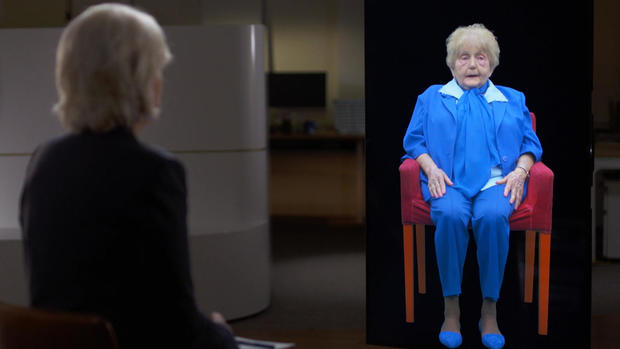Co-Founder, President, and Chief Visionary Officer at StoryFile
- venture name


Conversa is ‘conversational Video AI’: interactive 3d displays of real people which could robustly answer questions. The process is intensive:
- Interviewees are flow to California
- The are interviewed in ‘the bubble’: a dome with 6000 LED lights and more than 20 cameras.

- Interviewees had to have multiple sets of the same clothes (to ensure that there was image consistency for holograms)
- Interviewees (in this case holocaust survivors) were questioned from 9-5 for a week – being asked over 2000 questions – to have every conceivable question available
- With interactions: all of the answers to the questions are entered into a database. When a question is asked, the algorithm searches the database, bringing back what it thinks is the closest answer
Many cameras were used in order to future-proof the interviews so that as technology advances and 3D, hologram-like projection becomes the norm, they’ll have all the necessary angles to increase the graphic detail.
- a short bio of the founder-leader
Surprisingly, Maio-Smith began her career as an intrapreneur before going to entrepreneurship. Heather Maio-Smith is an experiential exhibit designer who has exhibited in Los Angeles, Cuba, and The United Nations The only thing listed in her education, is Jewish studies from University, which certainly lends to her working with Holocaust survivors. Her story (with Conversa) began with her work with Holocaust survivors and is indicative of her passion. Heather partnered with the USC Shoah Foundation for New Dimensions in Testimony to develop a new interview methodology.
When she came up with the idea for this project, she had been working on exhibits featuring Holocaust survivors. For years they’d interviewed nearly 55,000 of them so far and have stored their testimonies at the University of Southern California. But Heather wanted future generations to have the same opportunity to interact with these individuals as she had had.
Heather dreamed of something more dynamic, being able to actively converse with survivors after they’re gone “I wanted to talk to a Holocaust survivor like I would today,” Maio-Smith said. “With that person sitting right in front of me and we were having a conversation.” (https://www.cbsnews.com/news/holocaust-stories-artificial-intelligence-60-minutes-2022-03-27/). And she figured, in the age of artificial intelligence tools like Siri and Alexa, the technology had to be creatable – which is when she started building the team. While Co-Founder Heather Maio-Smith conceptualized the idea of keeping conversation alive with survivors of the Holocaust. Co-Founders Stephen Smith, Cecilia Chan, and Sam Gustman had the idea to document family history using cloud-based and crowdsourced technology. The four joined together and created StoryFile as a new way to automatically preserve human histories and share stories.
The team members
Cecilia – Co-Founder & Board Member
Ceci Chan brings to StoryFile 36 years of investment and strategic experience.
- Ceci has developed and funded private equity investments in the U.S., China, and in Europe, in technology, pharma, and crypto markets. Ceci joined the founders as an active strategist and investor, bringing globally impactful supporters and partners to StoryFile.
Sam Gustman – Co-Founder & Treasurer
For the last 29 years Sam Gustman has engineered and patented technologies for government, education, commercial studios and non-profit organizations.
- Sam was a founding member of StoryFile and helped create the technology team. With 16 patents in the area of digital asset management and security technologies, Sam has been working with video and complex media in the areas of preservation and distribution since the early days of the World Wide Web.
Val Jones – Chief Technology Officer
- Val comes to StoryFile with 20 years of experience in developing technology for real-world applications in entertainment, military applications, and intelligent software solutions.
- In 2002, Val began working in cultural heritage at the University of Southern California’s Institute for Creative Technologies, using 3D scanning techniques to virtually reunite the Parthenon and its sculptures. They developed new techniques to record dynamic human facial and full-body performance with ICT’s Academy Award-winning Light Stage, as seen in movies such as “Avatar”, “Logan ” and “BladeRunner 2049″. As part of their Ph.D. Val designed new display devices that can show 3D imagery to multiple viewers without the need for stereo glasses, winning “Best Emerging Technology” at SIGGRAPH 2007. They then applied this experience to build the scanning and display pipeline for Dimensions in Testimony, creating the world’s first interactive holographic interview so museum visitors around the country can experience face-to-face conversations with recorded Holocaust survivor testimonies.
Team Analysis: many of these team members came on early to the project and brought critical skills (tech knowledge, tech investment knowledge, team building, etc) which together has served to create powerful team and company. Not only that, each also had a vision which broadened the scope of the project/application to reach new markets/customers.
Personal reflections
Initially, Smith engaged with this idea for a not-for-profit venture. Recognizing the profitability (or scope of the application) of it, she spun it off into StoryFile. It is hard to say whether this is truly an innovative idea, or a remix: perhaps more of the latter. Certainly Maio-Smith has seen other ways to save and store information, but certainly with the advent of technologies like Alexa and Siri and similar programs, she could be arguably taking an idea from elsewhere, and putting it to work. We could certainly argue that this is a question of two technologies converging on each other: information curating and information accessibility.
The concept itself interacting with a hologram to provide information to a learner is one that has been used in science fiction quite often. From the earliest days of Star Trek the Next Generation, the idea of holographic training was popularized to more mainstream audiences. But I can see one thing that really stands out from Maio-Smith’s Work: passion. She loved what she did. She believed in what she did. And she looked for a way to convey that passion to other people. She was looking for a match between an experience, and a technology that was able to replicate that experience. She realized when the beginnings of that technology were available. And she has also been forward thinking in looking at what technologies will be available in the future. This is why she has recorded these individuals in such detail, because when full-fledged holography is available, she will have the data to take advantage of that technology.
Money and funding
StoryFile raised $2 million, in initial funding back in 2020. In 2021, it raised $4 million from undisclosed investors with plans to launch an iPhone version of the technology. And it hopes to close a Series A by early 2022-23.
SOURCES:
Artificial intelligence preserving our ability to converse with Holocaust survivors even after they die: https://www.cbsnews.com/news/holocaust-stories-artificial-intelligence-60-minutes-2022-03-27/
What is Conversa: https://storyfile.com/what-is-conversa/
Meet the StoryFile Team: https://storyfile.com/meet-the-team/
Funding articles
https://dot.la/storyfile-raise-2653285614.html
https://dot.la/storyfile-2648110620.html
And a podcast interview that I am definitely listening to with Maio-Smith: https://podbay.fm/p/eventual-millionaire/e/1650989964

You have to love Maio-Smith’s passion for preserving history; it is always more impactful hearing straight from the individual than reading a transcript of their accounts. It will be interesting to see if this venture actually takes off and makes money… again, I see it as a vital tool for historical record keeping but wonder if the for-profit version will be less labour-intensive than the original (answering 2000 questions would not be my favourite thing to partake in). I also like how this is such a forward thinking concept, as the technology is not quite there yet but Maio-Smith’s vision is that it will be there so be prepared for it. Definitely something to watch…
This is such a cool idea! I think that Heather represents a strong role model for would-be entrepreneurs in that she has obvious passion, expertise, and personal investment in the subject. Even if the world isn’t at the point where something like this is going to be used mainstream yet, VR is becoming more prevalent and affordable and there will be so many applications for the data that is being gathered now. There is obviously a talented team around her, and Heather has managed to pivot from a not-for-profit to a profitable business with this concept, showing that she has the flexibility to adapt her idea to continue her own involvement and suit a changing market.